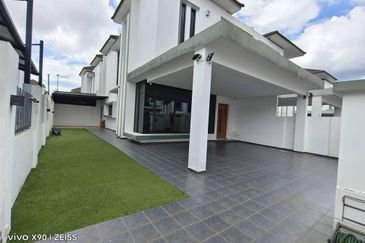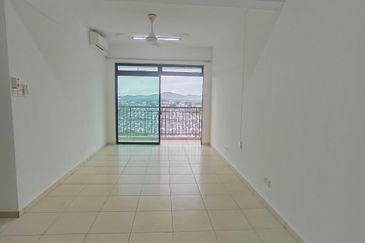Participants at The Edge Investment Forum on Real Estate 2009 sat up when Stephen Tew began his presentation by urging the 600-strong crowd to “Get ready to get rich!” He definitely got their attention. Tew might have been a litle dramatic but in essence, his optimism was generally shared by the panel of speakers. However, while the other panellists like residential property, Tew is enthusiastic about industrial and commercial real estate, an area he specialises in.
At the forum, participants heard ample reasons as to why investors should seize the opportunity to put their money on property.
But before you “close your eyes and buy”, as a Cantonese saying puts it, don’t throw caution to the winds when inking such big-ticket investments.
Previous property cycles have proven that real estate in good locations is not only more resilient in a downturn but values will bounce back before heading to chart new benchmarks in the next property boom. Besides location, property investment is about timing, be it buying to keep or buying to sell.
So, where is the current property market bottom? Are we there yet? No one knows for sure. What is definite is that the market has come off its peak and we are now in a down cycle.
Values, especially that of landed property, are holding in sought-after addresses while others have retreated — though it’s not as bad as in Dubai, the UK, Singapore and Hong Kong for instance — due to varying reasons, such as the less sexy location factor and the supply-demand equation.
The local property market takes its cue from the Malaysian economy that is expected to go into a technical recession in the wake of the global financial turmoil.
Meanwhile, the local bourse — which is generally viewed as a precursor of sentiment six months ahead on the property market — is experiencing a roller-coaster ride. Wall Street is faring no better. After the worst 4Q earnings season on record in the US, investors are braced for yet another round of poor profits.
In fact, George Soros, the billionaire hedge-fund manager, said the four-week rally in US stocks isn’t the start of a bull market because the economy is still shrinking, according to a Bloomberg report. Soros had made money last year while most of his peers lost money. For the record, the US lost 663,000 jobs last month and the jobless rate rose to 8.5%, the highest level in more than 25 years.
In Australia, home loan approvals rose in February for a fifth month as government grants to first-time buyers and interest-rate cuts spurred demand.
Over in China, housing prices are expected to stay flat through 2010. The government’s economic stimulus measures to spur buying and lower interest rates have failed to cut into a glut of homes, E-House (China) Holdings Ltd, a Shanghai-based real estate broker and consultant reportedly said.
On a brighter note, Vigers March review of the Hong Kong property market found home prices at key housing estates rising by 1.1% from the last quarter in 2008, indicating a slow recovery in the housing market. The city’s major leaders have slashed mortgage rates and more banks are expected to join the bandwagon soon.
Meanwhile, analysts are predicting the Dubai real estate market will likely return to positive territory in 2011, after stabilising in 2010.
Nearer to home, the Singapore Urban Redevelopment Authority (URA) released on April 1 flash estimates that show home prices dipping 13.8% on the private residential market. This is the largest quarterly drop since URA started releasing flash estimates of the residential property price index in 1975.
Attractive propositions
It is every investor’s dreams to enter the market at its bottom and cash out at the peak. In reality, realising that dream is likely to remain that — a dream.
What we have now is a regime of very attractive interest rates, made more alluring by special schemes from developers as they aggressively push sales.
Relatively cheaper property prices, if at all, can only be found on the secondary market.
For new launches, established developers — those who intend to be around for a long time — are not about to drop their prices for various reasons.
While petrol prices and inflationary pressures may have eased recently, cheaper land and lower development costs are not anticipated anytime soon.
Developers also need to keep buyers happy to build a loyal following. So, launching new products at cheaper prices cannot be a sound marketing strategy.
So what are developers doing to enhance their cash flow? An alternative strategy by established and bankable developers is to partner financial institutions to facilitate easier property ownership by providing a higher margin of end financing.
The developer absorbs the interest payment on the loan during the construction period which can be as much as three years, depending on whether it is a high-rise or landed property and when the sale and purchase agreement is inked.
The more aggressive developers make it possible for end-financing repayments to only kick in two years after the project is handed over.
This means that for a high-rise project that is to be handed over three years after signing the sale and purchase agreement, a buyer will only have to worry about the first repayment five years later.
By then, wouldn’t all the upheaval in the market be a thing of the past? If you opted to buy in a growth area, one with potential, will the value of your property have appreciated by then?
Realistically speaking, what developers are offering these days are not mere property buys but investment plans hinged on real estate.
There is risk in every investment; it is no different with real estate. First, ascertain how risk averse you are. Go with trusted names only. And never be a hero and abandon the location mantra, not even if a prospective buy sounds like an irresistible dream.
Au Foong Yee is editor of City & Country
This article appeared in City & Country, the property pullout of The Edge Malaysia, Issue 750, April 13-19, 2009.
TOP PICKS BY EDGEPROP

Residensi Aman Bukit Jalil
Bukit Jalil, Kuala Lumpur

De Cendana Apartment
Setia Alam/Alam Nusantara, Selangor























